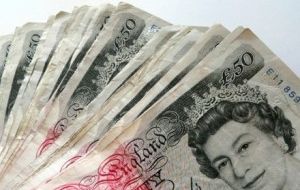MercoPress. South Atlantic News Agency
Bad, but good news from the UK economy: decline easing
 The UK annual drop of 5.5% remains the biggest since records began in 1955.
The UK annual drop of 5.5% remains the biggest since records began in 1955. The rate of contraction of the UK economy in the three months from April to June has been reduced by the Office for National Statistics (ONS). Gross domestic product (GDP) has been revised to a fall of 0.7% from 0.8% compared with the previous quarter.
The year on year decline has been revised to 5.5% from 5.6%. The ONS said the revision was due to better-than-expected output from the manufacturing, energy, wholesaling and motor vehicle sectors.
“It seems to have benefited from strength in general government spending and weakness in imports, which counts as a positive in GDP figures,” said Stephen Lewis at Monument Securities.
The 0.7% decline was a significant improvement on the 2.4% contraction in the previous quarter.
But the annual drop of 5.5% remains the biggest since records began in 1955.
“The upward revision was a bit of a surprise but it still shows a fairly steep contraction,” said George Buckley at Deutsche Bank.
“The most important piece of news is on inventories, which continued to fall at a fairly aggressive pace.”
Inventories are items such as the amount of raw materials held by a manufacturer or items to sell that are kept in stock by a retailer.
Despite the revision, the UK is still behind countries such as France and Germany that came out of recession by posting positive growth in the second quarter of the year.
Many economists are predicting that the UK economy will grow in the third quarter of the year, which covers the three months from July to September.
“I think this breakdown is consistent with the chance of seeing positive growth in Q3,” said Colin Ellis at Daiwa Securities.
Some economists had been expecting the latest GDP figure to be revised downwards, especially after the official figures for business investment on Thursday.
Business investment in the second quarter of the year fell 18.4% from the same period the year before to £29.89 billion It was the fastest rate of decline since records began 42 years ago.
“After this week's poor business investment figures, the GDP revision comes as a slight relief,” said David Kern, chief economist at the British Chambers of Commerce.
”However, the small improvement cannot obscure the severity of the UK recession and the challenges facing us”.(BBC).-




Top Comments
Disclaimer & comment rulesCommenting for this story is now closed.
If you have a Facebook account, become a fan and comment on our Facebook Page!